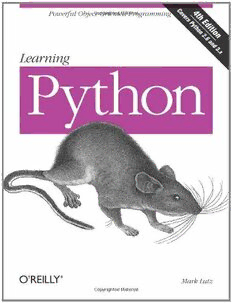
Learning Python: Powerful Object-Oriented Programming PDF
Preview Learning Python: Powerful Object-Oriented Programming
www.it-ebooks.info www.it-ebooks.info Learning Python www.it-ebooks.info www.it-ebooks.info FOURTH EDITION Learning Python Mark Lutz Beijing • Cambridge • Farnham • Köln • Sebastopol • Taipei • Tokyo www.it-ebooks.info Learning Python, Fourth Edition by Mark Lutz Copyright © 2009 Mark Lutz. All rights reserved. Printed in the United States of America. Published by O’Reilly Media, Inc., 1005 Gravenstein Highway North, Sebastopol, CA 95472. O’Reilly books may be purchased for educational, business, or sales promotional use. Online editions are also available for most titles (http://my.safaribooksonline.com). For more information, contact our corporate/institutional sales department: (800) 998-9938 or corporate@oreilly.com. Editor: Julie Steele Indexer: John Bickelhaupt Production Editor: Sumita Mukherji Cover Designer: Karen Montgomery Copyeditor: Rachel Head Interior Designer: David Futato Production Services: Newgen North America Illustrator: Robert Romano Printing History: March 1999: First Edition. December 2003: Second Edition. October 2007: Third Edition. September 2009: Fourth Edition. Nutshell Handbook, the Nutshell Handbook logo, and the O’Reilly logo are registered trademarks of O’Reilly Media, Inc. Learning Python, the image of a wood rat, and related trade dress are trademarks of O’Reilly Media, Inc. Many of the designations used by manufacturers and sellers to distinguish their products are claimed as trademarks. Where those designations appear in this book, and O’Reilly Media, Inc., was aware of a trademark claim, the designations have been printed in caps or initial caps. While every precaution has been taken in the preparation of this book, the publisher and author assume no responsibility for errors or omissions, or for damages resulting from the use of the information con- tained herein. ISBN: 978-0-596-15806-4 [M] 1252944666 www.it-ebooks.info To Vera. You are my life. www.it-ebooks.info www.it-ebooks.info Table of Contents Preface ................................................................... xxxi Part I. Getting Started 1. A Python Q&A Session ................................................... 3 Why Do People Use Python? 3 Software Quality 4 Developer Productivity 5 Is Python a “Scripting Language”? 5 OK, but What’s the Downside? 7 Who Uses Python Today? 7 What Can I Do with Python? 9 Systems Programming 9 GUIs 9 Internet Scripting 10 Component Integration 10 Database Programming 11 Rapid Prototyping 11 Numeric and Scientific Programming 11 Gaming, Images, Serial Ports, XML, Robots, and More 12 How Is Python Supported? 12 What Are Python’s Technical Strengths? 13 It’s Object-Oriented 13 It’s Free 13 It’s Portable 14 It’s Powerful 15 It’s Mixable 16 It’s Easy to Use 16 It’s Easy to Learn 17 It’s Named After Monty Python 17 How Does Python Stack Up to Language X? 17 vii www.it-ebooks.info Chapter Summary 18 Test Your Knowledge: Quiz 19 Test Your Knowledge: Answers 19 2. How Python Runs Programs ............................................. 23 Introducing the Python Interpreter 23 Program Execution 24 The Programmer’s View 24 Python’s View 26 Execution Model Variations 29 Python Implementation Alternatives 29 Execution Optimization Tools 30 Frozen Binaries 32 Other Execution Options 33 Future Possibilities? 33 Chapter Summary 34 Test Your Knowledge: Quiz 34 Test Your Knowledge: Answers 34 3. How You Run Programs ................................................. 35 The Interactive Prompt 35 Running Code Interactively 37 Why the Interactive Prompt? 38 Using the Interactive Prompt 39 System Command Lines and Files 41 A First Script 42 Running Files with Command Lines 43 Using Command Lines and Files 44 Unix Executable Scripts (#!) 46 Clicking File Icons 47 Clicking Icons on Windows 47 The input Trick 49 Other Icon-Click Limitations 50 Module Imports and Reloads 51 The Grander Module Story: Attributes 53 import and reload Usage Notes 56 Using exec to Run Module Files 57 The IDLE User Interface 58 IDLE Basics 58 Using IDLE 60 Advanced IDLE Tools 62 Other IDEs 63 Other Launch Options 64 viii | Table of Contents www.it-ebooks.info Embedding Calls 64 Frozen Binary Executables 65 Text Editor Launch Options 65 Still Other Launch Options 66 Future Possibilities? 66 Which Option Should I Use? 66 Chapter Summary 68 Test Your Knowledge: Quiz 68 Test Your Knowledge: Answers 69 Test Your Knowledge: Part I Exercises 70 Part II. Types and Operations 4. Introducing Python Object Types ......................................... 75 Why Use Built-in Types? 76 Python’s Core Data Types 77 Numbers 78 Strings 80 Sequence Operations 80 Immutability 82 Type-Specific Methods 82 Getting Help 84 Other Ways to Code Strings 85 Pattern Matching 85 Lists 86 Sequence Operations 86 Type-Specific Operations 87 Bounds Checking 87 Nesting 88 Comprehensions 88 Dictionaries 90 Mapping Operations 90 Nesting Revisited 91 Sorting Keys: for Loops 93 Iteration and Optimization 94 Missing Keys: if Tests 95 Tuples 96 Why Tuples? 97 Files 97 Other File-Like Tools 99 Other Core Types 99 How to Break Your Code’s Flexibility 100 Table of Contents | ix
